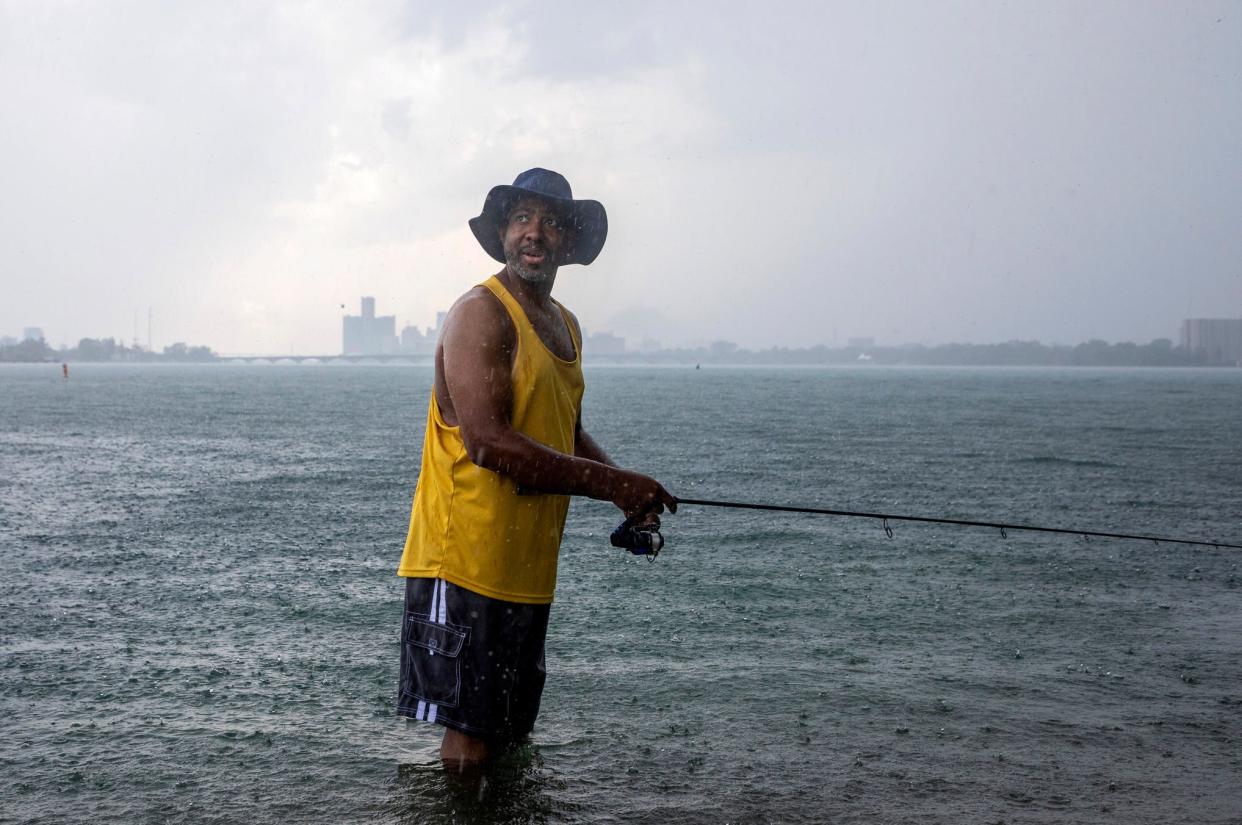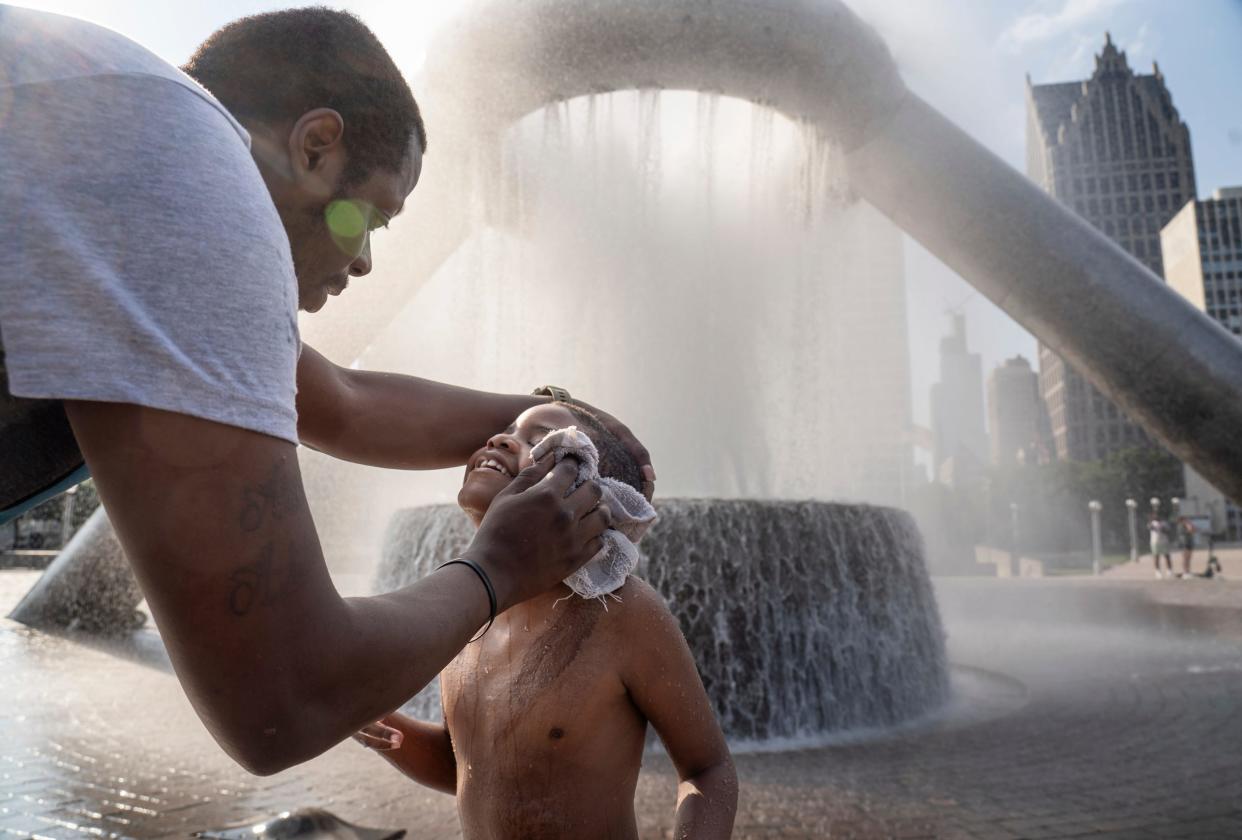As Michigan warms up, groups want FEMA to recognize extreme heat as 'major disaster'
More than two dozen groups are petitioning the federal government to include extreme heat as a qualifying condition for disaster relief as weather forecasters in southeast Michigan predict a daily pattern of dangerously hot weather and violent thundershowers that has knocked out electricity — and air conditioning — to tens of thousands of metro Detroit residents.
The petition, which was submitted earlier this week to the Federal Emergency Management Agency, seeks to amend regulations to include heat and wildfire smoke in the definition of "major disaster" and comes as climate scientists warn that hot summers have become more common and more intense.
Extreme heat is one of the leading weather-related dangers in America, annually taking hundreds of lives, and it’s expected to get worse, with the costs to fight it growing and, in some cases, starting to overwhelm local and state governments.
More: Most Michiganders set their AC thermostat to this temperature, new poll shows
"In recent years," the petition said, "increasing extreme heat events have impacted millions of workers and communities," citing examples that included farmworkers sowing crops, postal workers ducking in and out of searing hot trucks, warehouse workers experiencing record indoor heat, and "communities of color suffering disproportionate heat while living in concrete urban heat islands."
Still, more than a request to consider heat events as disasters, the petition could be seen as part of a larger effort to address dangers connected to rising temperatures all year, even in places like Michigan, which traditionally have had cold winters.

The U.S. Labor Department announced just last month, for instance, that it aims to adopt new safety rules in the workplace considering record-breaking temperatures nationwide, and in April, Gov. Gretchen Whitmer sent a letter to federal officials urging them to create new paths for federal relief for states affected by exceptionally warm winters, which hurt Michigan businesses that rely on snow.
Earlier this week, a heat advisory was issued by the National Weather Service for southeast Michigan, and a heat warning, the highest alert level, for Wayne, Oakland, Macomb and Genesee counties, where the concrete buildings and streets tends to hold in the heat, even overnight.
These heat islands — cities that include Detroit, which officials said Thursday have started reviewing the petition — are especially vulnerable to blistering temperatures.
'Simple but vital fix'
Under the lead petitioner Center for Biological Diversity's letterhead, the groups said that they want to "unlock critical funds" for states and local communities "to manage and mitigate extreme heat and wildfire smoke — both natural catastrophes predicted to worsen in duration, frequency, and severity due to the climate emergency."
The environmental, health and safety and labor groups — including the Communication Workers of America, of which many Free Press staffers are a member — sent the 77-page document to FEMA, which is charged with coordinating the federal disaster response.
The petition sought what it called a "simple but vital fix." It went into detail on the legal and historical background of federal disaster relief, and it noted that before the 1950s, federal disaster assistance was granted when states appealed directly to Congress.
By the late '70s and '80s, FEMA’s creation established a framework for giving assistance and defined "major disaster" as "any natural catastrophe," specifically citing, a list that includes: tornadoes, storms, floods, tsunamis, volcanic eruptions, landslides, and droughts; but not extreme heat.

And FEMA has denied assistance requests based on extreme heat: one in 1995 from Illinois, another in 1980 from Missouri, and a third, more recently in 2022, from California. The reason given: Seasonal or atmospheric conditions did not meet the agency's disaster definition.
But the new petition suggested that it is time to amend that position.
Extreme heat, the petition emphasized, is "particularly dangerous for disadvantaged communities … less able to prepare for, withstand and recover from," and by one analysis, Arizona, New Mexico Louisiana and Texas were expected to experience extreme heat for a third of the year.
New federal relief
Big city residents — especially those in poverty who might not be able to afford air conditioning to begin with — are especially susceptible to heat exhaustion, heat stroke and other health risks. And the hot weather in rural, forested areas creates conditions that cause wildfires that burn for weeks.
To curb the effects of the extreme heat and bad air, cities and states nationwide are increasingly offering more cooling centers, more bottled water distribution and air filtration systems to protect schoolchildren, especially those with asthma.
Last year, out-of-control wildfires in Canada sent smoke wafting toward Michigan.
And after the last winter, which, in Michigan, was one of the warmest on record, the governor sought federal assistance for businesses who were not eligible under current federal guidelines. It was so warm that in late February, thermometers in Detroit hit 73 degrees.
"I’m asking the federal government to create new paths of federal relief for all impacted," Whitmer said in April, adding: "We know climate change will only exacerbate this issue in future years, and there needs to be reliable and well-tailored programs to help in those cases."
Still, unlike other disasters — such as floods and tornadoes ― FEMA must consider more than property destruction if it were to consider heat events. The damage from a heat wave is difficult to measure and tied to risks to a person’s health, more than whether their homes were destroyed.
The heat dome
The state — and nation — is facing intense heat once again this week.
The recent, stifling temperatures, are being caused, in part, by what meteorologists call a heat dome, a kind of oven-like situation in which high-pressure atmospheric conditions trap hot stagnant air like the lid on a hot pan.
And the heat index, a measure of how hot it feels, showing temperatures of nearly 100 degrees — and more.
Moreover, in addition to the heat, the state Department of Environmental Quality on Thursday issued an air quality advisory, noting that ozone levels were elevated Thursday, which can trigger respiratory problems, in Livingston, Macomb, Monroe, Oakland, St. Clair, Washtenaw and Wayne counties.
And in Detroit — where a third of the population is in poverty and the temperature can feel about 8 degrees hotter because of all the urbanization, according to Climate Central, a Princeton, N.J., nonprofit organization that analyzes climate science reports ― the heat adds to the stress of daily life.
Forecasters said temperatures in Michigan have, and are expected to remain, in the 90s, this week, which was unusual for late spring. And, they added, even if the heat wave ends next week, there are sure to be many more hot days.
Thursday, it turns out, is just the first day of summer.
Contact Frank Witsil: 313-222-5022 or fwitsil@freepress.com.
This article originally appeared on Detroit Free Press: As Detroit sweats, groups want extreme heat to count as a disaster
